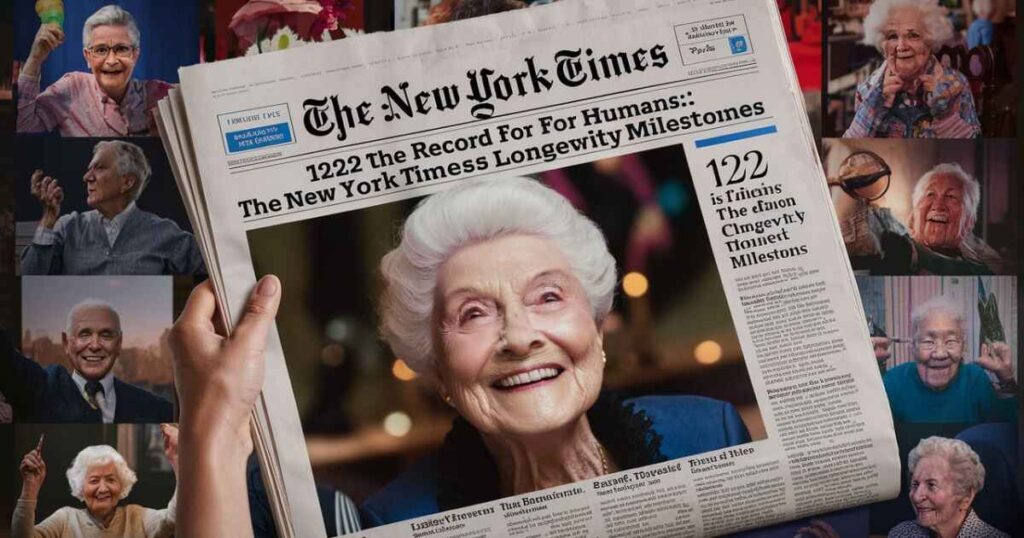In the vast tapestry of human history, few achievements capture our collective imagination quite like the pursuit of longevity. The quest to extend human life has been a cornerstone of scientific research, philosophical debate, and cultural fascination for centuries.
At the heart of this pursuit lies a remarkable number: 122. This figure represents the current record for human longevity, a milestone that has been meticulously documented and celebrated by one of the world’s most respected news sources, The New York Times (NYT).
As we delve into this extraordinary feat, we’ll explore not only the record itself but the broader implications it holds for our understanding of human potential and the future of aging.
The 122-Year Record Holder: Jeanne Calment
The story of human longevity reached its pinnacle with Jeanne Calment, a French woman whose life spanned three centuries. Born in 1875, Calment lived through an era of unprecedented technological and social change, ultimately passing away in 1997 at the astounding age of 122 years and 164 days.
Calment’s life was extraordinary not just in its length, but in its vitality. The NYT reported on her remarkable habits and lifestyle, which included:
- Consuming olive oil regularly
- Enjoying port wine in moderation
- Indulging in chocolate
- Smoking cigarettes until the age of 117
Her longevity outlasted that of her daughter and grandson, making her a living testament to the potential of human lifespan. The New York Times chronicled her life and death with the headline “Jeanne Calment Dies at 122; Oldest Person on Record,” cementing her place in history and sparking global conversations about the limits of human aging.
Calment’s life was a window into the past. Born when the telephone was still a novelty, she lived to see the dawn of the internet age. Her memories included selling canvases to Vincent van Gogh, whom she described as “dirty, badly dressed and disagreeable.”
This remarkable span of experiences made her not just a record holder, but a living historical treasure, providing insights into a world long past.
The Evolution of Human Longevity Records
The journey to 122 years didn’t happen overnight. The NYT has been at the forefront of reporting on longevity milestones throughout its history. Here’s a more detailed timeline of significant longevity records:
| Year | Record Holder | Age | Notable Fact |
| 1903 | Kane Tanaka | 117 | Oldest living person at the time of NYT report |
| 1955 | Betsy Baker | 113 | Oldest American at the time |
| 1965 | William Fullingim | 115 | Oldest man on record at the time |
| 1990 | Jeanne Calment | 115 | Recognized as oldest living person |
| 1997 | Jeanne Calment | 122 | Current record holder |
| 2017 | Emma Morano | 117 | Last known person born in the 19th century |
| 2022 | Kane Tanaka | 119 | Oldest verified living person until her death |
These records reflect not just individual achievements, but broader trends in human health and longevity. Factors contributing to increased human lifespan include:
- Advancements in healthcare systems
- Improved nutrition and dietary knowledge
- Technological innovations in medicine
- Greater understanding of genetic factors influencing aging
- Public health initiatives and improved sanitation
- Reduction in infant mortality rates
- Increased awareness of the importance of physical activity
The steady increase in record ages over the years demonstrates the cumulative effect of these factors. However, it’s worth noting that the jump from 119 to 122 years remains a significant outlier, highlighting the exceptional nature of Calment’s longevity.
Read Also: Unlocking the Enigma: Swampy Areas in the Southern US NYT Crossword Clue
Beyond 122: Other Remarkable Human Records
While the 122-year lifespan remains the pinnacle of human longevity, the NYT has reported on numerous other age-related achievements that push the boundaries of what we thought possible. Some notable examples include:
- Fauja Singh: Began marathon running at age 89 and continued past 100. He completed the Toronto Waterfront Marathon at the age of 100, becoming the oldest person to finish a marathon.
- Tao Porchon-Lynch: Recognized by Guinness World Records as the world’s oldest yoga teacher at 101 years old. She continued teaching yoga until her death at 101, inspiring thousands with her vitality and wisdom.
- Doris Buffett: Sister of Warren Buffett, who at 96 founded the Sunshine Lady Foundation, giving away millions to charity. Her late-life philanthropy challenges perceptions of what’s possible in advanced age.
- Robert Marchand: Set a world record in one-hour track cycling at the age of 105, pedaling 14 miles in an hour.
- Nola Ochs: Became the world’s oldest college graduate at 95, earning a history degree from Fort Hays State University in Kansas.
These individuals demonstrate that advanced age need not be a barrier to physical prowess, mental acuity, or social contribution. Their stories, chronicled by the NYT, serve as inspiration and challenge our preconceptions about aging.
The Science Behind Extreme Longevity
The quest to understand and potentially extend human lifespan has been a focal point of scientific research. The New York Times has consistently reported on breakthroughs and debates in this field. Key areas of study include:
- Genetic factors: Researchers have identified certain genes associated with longevity, such as the FOXO3 gene. Studies on centenarians have revealed genetic variations that may contribute to their exceptional lifespan.
- Telomere length: These protective caps on chromosomes may play a role in aging and longevity. Scientists are exploring ways to maintain telomere length as a potential means of slowing the aging process.
- Caloric restriction: Studies suggest that reducing calorie intake while maintaining nutrition might extend lifespan. This approach has shown promise in animal studies, though its applicability to humans remains a topic of ongoing research.
- Oxidative stress: Understanding and mitigating cellular damage caused by free radicals is crucial to longevity research. Antioxidants and their role in combating oxidative stress have been a significant focus of anti-aging studies.
- Senescent cells: These are cells that have stopped dividing but don’t die off, potentially contributing to age-related diseases. Research into removing these cells (senolytics) is a promising area in longevity science.
- Epigenetics: The study of how environmental factors can influence gene expression without changing DNA sequence is providing new insights into the aging process.
- Microbiome research: The complex ecosystem of microorganisms in our bodies, particularly in the gut, is being studied for its potential impact on longevity and overall health.
These areas of research, often reported by the NYT, represent the cutting edge of our understanding of human aging and potential pathways to extending healthy lifespan.
Controversies and Challenges
The pursuit of extreme longevity is not without its controversies. The NYT has reported on various challenges and debates surrounding age verification and the implications of life extension:
- Verification difficulties: Accurately confirming ages, especially for those born in the late 19th century, can be challenging. The case of Jeanne Calment herself has been subject to scrutiny, with some researchers questioning the authenticity of her age claim.
- Ethical considerations: Questions arise about the societal impact of significantly extended lifespans. Would longer lives exacerbate existing inequalities? How might it affect family structures and intergenerational relationships?
- Resource allocation: Concerns about healthcare and social security systems adapting to an aging population. The economic implications of a significantly older population are a topic of ongoing debate.
- Quality of life: Debates on whether extending lifespan is beneficial if quality of life cannot be maintained. The goal of longevity research is increasingly focused on extending “healthspan” rather than just lifespan.
- Overpopulation concerns: Critics argue that dramatically increased lifespans could lead to unsustainable population growth, straining global resources.
- Psychological impact: The potential psychological effects of greatly extended lifespans on individuals and society are largely unknown and a subject of speculation.
- Inequality in access: As with many medical advancements, there are concerns that life-extension technologies could be available only to the wealthy, further widening societal divides.
These controversies, often explored in NYT articles, highlight the complex interplay between scientific advancement, ethics, and societal impacts in the field of longevity research.
The Future of Human Longevity
As we look beyond the current record of 122 years, scientists and futurists continue to speculate on the potential for human longevity. The New York Times remains at the forefront of reporting on these developments:
- Biotechnology advancements: CRISPR gene editing and stem cell therapies show promise in addressing age-related decline. Researchers are exploring ways to repair or replace damaged cells and tissues, potentially reversing some aspects of aging.
- Artificial intelligence: AI-driven drug discovery could accelerate the development of anti-aging treatments. Machine learning algorithms are being used to analyze vast datasets and identify potential interventions to slow or reverse aging processes.
- Nanotechnology: Microscopic robots might one day repair cellular damage associated with aging. While still in its infancy, nanotech could revolutionize how we approach age-related diseases and cellular decay.
- Organ regeneration: Advances in tissue engineering and 3D bioprinting may lead to the ability to grow replacement organs, extending lifespans by replacing failing body parts.
- Personalized medicine: Tailoring treatments based on individual genetic profiles could optimize health outcomes and potentially extend lifespans.
- Brain-computer interfaces: As we better understand the brain, technologies that enhance cognitive function or even allow for the transfer of consciousness could redefine our concept of lifespan.
- Cryonics: While controversial, the idea of preserving bodies or brains for future revival continues to captivate some researchers and futurists.
While breaking the 122-year record remains a distant goal, ongoing research continues to push the boundaries of what we thought possible in human lifespan extension. The NYT’s coverage of these developments provides a window into the rapidly evolving field of longevity science.
Read Also: Peplum Top 2012: A Comprehensive Guide to Fashion Trends and Styling Tips
The Impact of Longevity on Society
As we contemplate the possibility of lifespans extending beyond 122 years, it’s crucial to consider the broader societal implications. The New York Times has explored various aspects of this potential future:
- Workforce and retirement: Extended lifespans could dramatically reshape our concept of career and retirement. We might see multiple careers in a single lifetime, or a redefinition of retirement altogether.
- Education systems: Longer lives might necessitate a shift towards lifelong learning models, with education becoming a continuous process rather than a phase of life.
- Family structures: Multi-generational families could become the norm, with potentially seven or more generations alive simultaneously.
- Healthcare systems: A shift towards preventative care and management of chronic conditions over acute care might be necessary to support a much older population.
- Urban planning: Cities may need to be redesigned to accommodate the needs of a significantly older population, focusing on accessibility and community engagement.
- Economic models: Current economic systems based on traditional life cycles may need to be reimagined to account for much longer productive lifespans.
These potential changes, often discussed in NYT articles, highlight the far-reaching consequences of dramatically extended human lifespans.
Conclusion
In conclusion, the record of 122 years stands as a testament to human resilience and the advancements in science and healthcare. As the New York Times continues to chronicle our journey towards longer, healthier lives, we are reminded of the extraordinary potential within each of us. The quest for longevity is not just about adding years to life, but life to years, inspiring us to make the most of every moment we have.
The story of human longevity, from Jeanne Calment’s remarkable 122 years to the cutting-edge research of today, is a narrative of hope, challenge, and endless possibility. As we stand on the brink of potentially revolutionary advances in life extension, the conversations and debates sparked by these developments will shape the future of humanity.
The New York Times, in its role as a chronicler of human achievement, will undoubtedly continue to be at the forefront of reporting on this most fundamental of human quests the pursuit of a longer, healthier life.
Frequently Asked Questions
What is the human record for 122?
The oldest verified human age is 122 years and 164 days, held by Jeanne Calment from France.
What is the record for fastest human travel?
The fastest speed achieved by a human is 39,937 km/h (24,791 mph) by the Apollo 10 astronauts in 1969.
Who is the goddess of love in the Roman NYT?
The Roman goddess of love is Venus.
What is the world record for life?
The world record for the longest human life is 122 years, held by Jeanne Calment.
Who holds the record for fastest human?
Usain Bolt holds the record for the fastest human, with a 100m sprint time of 9.58 seconds.

Ella Marie is a dedicated fashion enthusiast committed to curating the latest trends and timeless styles. With a keen eye for detail and a passion for elegance, they ensure every visitor finds inspiration and sophistication on the site.








